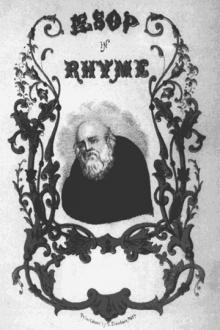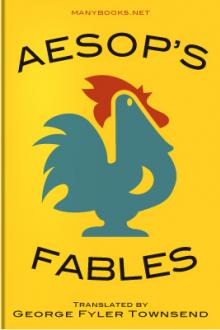author - "Aesop"

me may be rotten; But if twenty for accidents should be detach'd, It will leave me just sixty sound eggs to hatch'd."Well, sixty sound eggs--no; sound chickens, I mean; Of these some may die--we'll suppose seventeen-- Seventeen!--not so many--say ten at the most, Which will leave fifty chickens to boil or to roast. "But then there's their barley; how much will they need? Why they take but one grain at a time when they feed, So that's a mere trifle; now then let us see, At a fair

t a distance, and do not come near me, for if you touch me ever so slightly, I shall be broken in pieces; and besides, I by no means wish to come near you."Equals make the best friends. The Gnat and the Lion. A Gnat came and said to a Lion: "I do not the least fear you, nor are you stronger than I am. For in what does your strength consist? You can scratch with your claws, and bite with your teeth--so can a woman in her quarrels. I repeat that I am altogether more powerful than you;

he Woodman seized his axe, and with one stroke cut the Serpent in two. "Ah," said he,"No gratitude from the wicked." The Bald Man and the Fly There was once a Bald Man who sat down after work on a hot summer's day. A Fly came up and kept buzzing about his bald pate, and stinging him from time to time. The Man aimed a blow at his little enemy, but acks palm came on his head instead; again the Fly tormented him, but this time the Man was wiser and said: "You will only

at who can."The Fox and the Goat A FOX one day fell into a deep well and could find no means of escape. A Goat, overcome with thirst, came to the same well, and seeing the Fox, inquired if the water was good. Concealing his sad plight under a merry guise, the Fox indulged in a lavish praise of the water, saying it was excellent beyond measure, and encouraging him to descend. The Goat, mindful only of his thirst, thoughtlessly jumped down, but just as he drank, the Fox informed him of the

Description Whether it’s the benefits of taking it slow and steady (“The Tortoise and the Hare”), the necessity of invention (“The Crow and the Pitcher”), or the problems of cognitive dissonance (“The Fox and the Grapes”), Aesop has a fable for every occasion. Aesop lived in Greece in the 6th century BCE, far enough in the past that it’s become impossible to ascribe all these fables to him. Some were certainly retellings of older myths, some share their roots in collections of fables from India

me may be rotten; But if twenty for accidents should be detach'd, It will leave me just sixty sound eggs to hatch'd."Well, sixty sound eggs--no; sound chickens, I mean; Of these some may die--we'll suppose seventeen-- Seventeen!--not so many--say ten at the most, Which will leave fifty chickens to boil or to roast. "But then there's their barley; how much will they need? Why they take but one grain at a time when they feed, So that's a mere trifle; now then let us see, At a fair

t a distance, and do not come near me, for if you touch me ever so slightly, I shall be broken in pieces; and besides, I by no means wish to come near you."Equals make the best friends. The Gnat and the Lion. A Gnat came and said to a Lion: "I do not the least fear you, nor are you stronger than I am. For in what does your strength consist? You can scratch with your claws, and bite with your teeth--so can a woman in her quarrels. I repeat that I am altogether more powerful than you;

he Woodman seized his axe, and with one stroke cut the Serpent in two. "Ah," said he,"No gratitude from the wicked." The Bald Man and the Fly There was once a Bald Man who sat down after work on a hot summer's day. A Fly came up and kept buzzing about his bald pate, and stinging him from time to time. The Man aimed a blow at his little enemy, but acks palm came on his head instead; again the Fly tormented him, but this time the Man was wiser and said: "You will only

at who can."The Fox and the Goat A FOX one day fell into a deep well and could find no means of escape. A Goat, overcome with thirst, came to the same well, and seeing the Fox, inquired if the water was good. Concealing his sad plight under a merry guise, the Fox indulged in a lavish praise of the water, saying it was excellent beyond measure, and encouraging him to descend. The Goat, mindful only of his thirst, thoughtlessly jumped down, but just as he drank, the Fox informed him of the

Description Whether it’s the benefits of taking it slow and steady (“The Tortoise and the Hare”), the necessity of invention (“The Crow and the Pitcher”), or the problems of cognitive dissonance (“The Fox and the Grapes”), Aesop has a fable for every occasion. Aesop lived in Greece in the 6th century BCE, far enough in the past that it’s become impossible to ascribe all these fables to him. Some were certainly retellings of older myths, some share their roots in collections of fables from India
